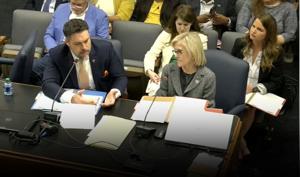News from the South - Florida News Feed
Paramedic attacked, assaulted unconscious woman on way to the hospital — and filmed it, police say
SUMMARY: A former paramedic, James Melody, has been arrested in Volusia County for sexually assaulting an unconscious woman three years ago. The incident surfaced during an unrelated investigation, revealing cell phone footage of Melody molesting the victim while on duty. Sheriff Rick Staley condemned Melody’s actions, calling them disturbing and suggesting he deserves severe punishment. The sheriff’s office believes there may be more victims and encourages anyone with memories of possible assaults to come forward. Dr. Jamie Lacy stresses the importance of reporting such incidents, assuring that sharing stories can help others. Those seeking support can contact the sheriff’s office anonymously.

A Florida paramedic is accused of molesting an unconscious woman in the back of an ambulance as she was being transported to the hospital. It allegedly happened in 2021 — and the woman has no idea, officials said. James Tyler Melady, the alleged suspect, retired from Flagler County Fire Rescue earlier this year, per the arrest report. Detectives were investigating Melady for other alleged sex offenses when they found two videos of the alleged assault in 2021, the report said.
#Florida #Crime #News
Subscribe to FOX 35 Orlando: https://bit.ly/3ACagaO
Watch FOX 35 Orlando LIVE newscasts: https://www.FOX35Orlando.com/live
Download FOX 35 news & weather apps: https://www.fox35orlando.com/apps
FOX 35 Orlando delivers breaking news, live events and press conferences, investigations, politics, entertainment, business news and local news stories and updates from Orlando, Orlando metro, and across Florida.
Watch more from FOX 35 on YouTube
Newest videos: https://www.youtube.com/myfoxorlando/videos
Most viewed/viral videos: https://www.youtube.com/watch?v=jgNn6rfByAM&list=PLzmRitN2dDZvlKw0C1IH3nLFGlbqgvp5C
We Love Florida: https://www.youtube.com/playlist?list=PLzmRitN2dDZuWecugac4QebPGp5-HZ5XP
Central Florida’s True Crime Files: https://www.youtube.com/watch?v=QAxwHLIeahA&list=PLzmRitN2dDZvk9zWypuHs9n38zuwnUSpx
More news stories: http://www.FOX35Orlando.com
Watch FOX 35 News live: https://fox35orlando.com/live
FOX 35 News newsletter: https://www.fox35orlando.com/email
Follow FOX 35 Orlando on Facebook: https://www.facebook.com/FOX35Orlando
Follow FOX 35 Orlando on Twitter: https://twitter.com/fox35orlando
Follow FOX 35 Orlando on Instagram: https://www.instagram.com/fox35orlando
News from the South - Florida News Feed
South Florida Weather for Tuesday 4/29/2025 12PM
SUMMARY: South Florida weather on Tuesday, 4/29/2025, features scattered rain mainly near Palm Beach County, Lake Okeechobee, parts of Weston, Southwest Ranches, Little Haiti, Miami Beach, southern Dade County, and the upper Keys. Showers are expected to be light on the peninsula, with heavier rain moving toward the interior and Gulf Coast later in the day. Temperatures are in the low 80s, cooler than the previous day, with muggy conditions and increasing winds causing rough surf and high rip current risks. Breezy conditions continue, creating hazardous beach and boating environments. Rain chances drop Thursday and Friday, with warming temperatures and scattered showers returning over the weekend.

NEXT Weather meteorologist Lissette Gonzalez says Tuesday afternoon will be a mix of sun and clouds. A stray shower can’t be ruled out.
News from the South - Florida News Feed
Trump to offer automakers some relief on his 25% tariffs, after worries they could hurt US factories
SUMMARY: President Donald Trump will sign an executive order to ease some of his 25% tariffs on autos and auto parts, reversing a policy that threatened domestic manufacturers. The tariffs raised vehicle prices, reduced sales, and hurt U.S. production competitiveness. The order aims to prevent multiple tariffs on foreign-made vehicles, reduce tariffs on imported parts for domestic assembly, and will be retroactive. Treasury Secretary Scott Bessent said the goal is to boost domestic auto jobs. This move coincides with Trump’s 100 days back in office and his visit to Michigan, a key auto manufacturing state he won in the previous election.
The post Trump to offer automakers some relief on his 25% tariffs, after worries they could hurt US factories appeared first on www.news4jax.com
News from the South - Florida News Feed
Biden wanted Medicaid to pay for weight-loss drugs. Trump just said it doesn’t have to.
by Shalina Chatlani, Florida Phoenix
April 29, 2025
The Trump administration this month scrapped a Biden-era proposal that would have required state Medicaid programs and allowed federal Medicare to pay for some GLP-1s for obesity treatments. Instead, state Medicaid programs will retain the choice of whether to cover the high-priced medications for their residents.
The drugs, which have historically been prescribed to diabetic patients, also help patients lose weight and have grown in popularity among doctors and patients. But they are generally too expensive for most people to afford without insurance.
While doctors and patient advocates say these drugs are critical to helping patients struggling with obesity and can save money in the long run by reducing comorbidities such as heart disease, others say the medications are just too expensive for most states to afford. More than a dozen state Medicaid programs have opted to cover GLP-1s for obesity treatment, and the proposed Biden rule would have asked all states to figure out how to pay for them. But now, advocates fear these drugs may continue to be out of reach for many.
“It’s unfortunate that they’re excluding a whole class of medications that seem to have a tremendous number of health benefits to patients,” Dr. Nicholas Pennings, chair of family medicine at Campbell University in Buies Creek, North Carolina, said in an interview.
GLP-1s, which stand for glucagon-like peptide-1, are a class of drugs that balance blood sugar levels. They’ve long been prescribed to patients with Type 2 diabetes. But since the drugs also curb hunger signals, doctors may prescribe these drugs — including popular brands Wegovy and Ozempic — to help patients lose weight.
Medicaid is a joint federal-state funded program that mostly serves people with lower incomes under the age of 65 or who have a disability. The federal Medicare program focuses primarily on people above the age of 65, no matter their income.
How and whether to cover expensive treatments and drugs can be a significant deliberation for state Medicaid directors. In North Carolina, where 70% of people struggle with being overweight or obese, officials opted to begin covering the drugs for weight loss last year. That coverage has been a game changer, said Pennings, who continues to treat Medicaid patients.
I think that’s just part of the inherent bias towards the treatment of people with obesity, feeling like it’s cheating or not necessary.
– Dr. Nicholas Pennings, chair of family medicine, Campbell University
“They are expensive, but there’s a lot of other medications that are expensive too. Why is it that obesity medications and diabetes medications are being selected out?” Pennings said. “I think that’s just part of the inherent bias towards the treatment of people with obesity, feeling like it’s cheating or not necessary.”
The list price for Wegovy is around $1,300 per month, and for Ozempic, around $1,000. Even so, the skyrocketing popularity of these drugs has prompted at least 14 state Medicaid departments to begin covering these drugs to treat obesity in the past decade.
In addition to North Carolina, those states include California, Delaware, Kansas, Massachusetts, Michigan, Minnesota, Mississippi, New Hampshire, Pennsylvania, Rhode Island, South Carolina, Virginia, and Wisconsin.
An annual survey of Medicaid directors from health policy research group KFF recently found that half of the 47 responding states not already covering the drugs were considering doing so.
‘Significant concerns’
In January, the National Association of Medicaid Directors told the federal Centers for Medicare & Medicaid Services that state Medicaid departments had “significant concerns over the fiscal impacts” of the Biden proposal to require coverage of GLP-1s, and “strongly recommend that CMS maintain the current state option to cover or not cover anti-obesity medications.”
But others say covering the drugs will yield long-term savings.
John Cawley, a professor of economics and public policy at Cornell University who has studied the economic impacts of obesity, has found that obesity essentially doubles a person’s annual health care costs due to comorbidities such as heart disease, fatty liver disease, and kidney disease.
He’s found that weight loss among those with extreme obesity, with a BMI of 40 or higher, can yield substantial reductions in medical care costs.
Cawley added that state Medicaid programs “have a lot of flexibility” in ensuring costs don’t get out of control, by, for example, covering a newly available generic version of GLP-1s, requiring prior authorization, and asking patients to try behavioral programs before getting a prescription.
North Carolina’s Medicaid department began covering GLP-1s for obesity in August. The state has been able to afford GLP-1 coverage by negotiating rebates, or discounts, with drug manufacturers, and by getting the federal government to cover some costs. Department leaders think lowering obesity will save the state money in the long run, said Jay Ludlam, deputy secretary for North Carolina Medicaid.
He said that one of the benefits of Medicaid is that “we get to choose, as a state, where we want to make kind of those extra investments or not.” He added that covering the medications could be potentially financially feasible for other states.
“Each program is different and has its own pressures. It would be welcome to be able to come together with other states to be able to negotiate broader deals,” Ludlam said. “If North Carolina is able to get a good deal, I don’t know why other states wouldn’t be able to participate in that.”
‘Shortsighted, bad policy’
In 2023, Connecticut enacted a law requiring Medicaid to cover obesity treatment services. The program began covering GLP-1s for weight loss, but costs were significant enough that the state told providers this year that it is now focusing on other obesity treatments instead.
Sean Scanlon, the Connecticut comptroller, said that not covering GLP-1s is “shortsighted, bad policy.” The state health plan, which takes care of teachers and other state employees, has been covering the drugs for weight loss since 2023. The plan controls costs by only prescribing GLP-1s after patients go through some online weight-loss counseling, said Scanlon.
“The most fiscally conservative thing we can do is give people tools that will save the taxpayers money in the long run,” he said in an interview. “And GLP-1 drugs are one of the best tools that we have to ensure that the taxpayers are not going to pay more money for the health care of hundreds of millions of people in the long run.”
It’s unclear whether the federal government will reverse course. In the past, Health and Human Services Secretary Robert F. Kennedy Jr. has recommended “three good meals a day” and behavioral changes rather than weight-loss medication.
But this month, Kennedy told CBS News he’s considering a regulatory framework to have Medicare and Medicaid cover these “extraordinary drugs” in the future, once their cost goes down.
“Ideally, over the long-term, we’d like to see those drugs available for people after they try other interventions,” Kennedy said.
This story first appeared in Stateline, part of States Newsroom, a nonprofit news network supported by grants and a coalition of donors as a 501c(3) public charity. Stateline maintains editorial independence. Contact Editor Scott S. Greenberger for questions: info@stateline.org. Follow Stateline on Facebook and X. Stateline reporter Shalina Chatlani can be reached at schatlani@stateline.org.
Florida Phoenix is part of States Newsroom, a nonprofit news network supported by grants and a coalition of donors as a 501c(3) public charity. Florida Phoenix maintains editorial independence. Contact Editor Michael Moline for questions: info@floridaphoenix.com.
The post Biden wanted Medicaid to pay for weight-loss drugs. Trump just said it doesn’t have to. appeared first on floridaphoenix.com
Note: The following A.I. based commentary is not part of the original article, reproduced above, but is offered in the hopes that it will promote greater media literacy and critical thinking, by making any potential bias more visible to the reader –Staff Editor.
Political Bias Rating: Centrist
This content presents a balanced view of the issue surrounding Medicaid coverage for expensive weight-loss drugs, particularly GLP-1s. It includes perspectives from multiple stakeholders: the Biden administration’s proposal for broader coverage (generally seen as a progressive policy), the Trump administration’s decision to leave coverage up to states (a more conservative approach), as well as opinions from healthcare professionals, economists, and state officials. The article provides factual information, highlighting both the benefits of the drugs and the fiscal concerns, without overtly favoring one political stance over another. Such framing and presentation indicate a centrist approach aiming to inform rather than advocate.
-

 News from the South - Missouri News Feed3 days ago
News from the South - Missouri News Feed3 days agoMissouri lawmakers on the cusp of legalizing housing discrimination
-

 Mississippi Today2 days ago
Mississippi Today2 days agoDerrick Simmons: Monday’s Confederate Memorial Day recognition is awful for Mississippians
-

 Mississippi Today5 days ago
Mississippi Today5 days agoStruggling water, sewer systems impose ‘astronomic’ rate hikes
-

 News from the South - West Virginia News Feed5 days ago
News from the South - West Virginia News Feed5 days agoIs West Virginia — and the rest of the country — prepared to care for our seniors?
-

 Mississippi Today5 days ago
Mississippi Today5 days agoParents, providers urge use of unspent TANF for child care
-

 News from the South - Arkansas News Feed7 days ago
News from the South - Arkansas News Feed7 days agoOp-Ed: Another dismal year for ranked-choice voting | Opinion
-

 News from the South - Florida News Feed4 days ago
News from the South - Florida News Feed4 days agoFlorida woman accused of setting fires during burn ban
-

 News from the South - Louisiana News Feed5 days ago
News from the South - Louisiana News Feed5 days agoTaxes on vapes and smokeless tobacco advance through committee | Louisiana










































